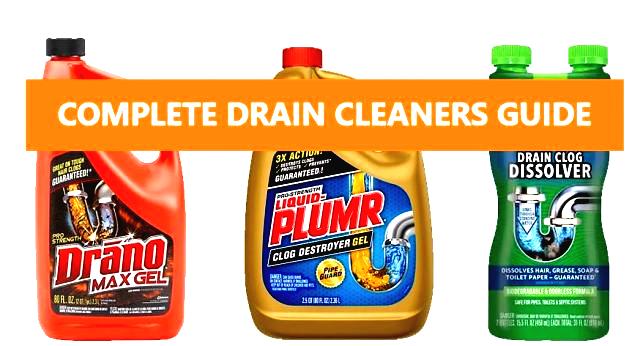The Ultimate Guide to the Best Drain Cleaners
There’s nothing more frustrating than watching the water swirl slowly down the drain—or worse, not at all. Clogged drains are an all-too-common issue in many households, often caused by everyday substances like hair, grease, or food debris. When plungers and DIY fixes fail, many turn to drain cleaners as a quick fix.
At Choice Plumbing Orlando, we're here to guide you through the different types of drain cleaners, their risks, and how to safely maintain your drains.
This guide will also cover natural alternatives and best practices for keeping your drains in optimal condition.
The Purpose of Drain Cleaners
When plungers, the most common method for removing clogs, don’t work, people often turn to store-bought drain cleaners. These products are easy to use, inexpensive, and promise fast results without the need to call in a plumber.
Liquid Drain Cleaners can handle minor obstructions, but they come with risks. Prolonged use of these products may erode metal pipes, especially cast iron in older Orlando homes. Always use safety precautions when handling these products.
In cases of severe or persistent clogs, it may be safer and more effective to use mechanical methods such as a drain snake or seek professional assistance.
Types of Drain Cleaners
When it comes to drain cleaning, there are three main categories: chemical, enzymatic/bacterial, and mechanical cleaners. Each type serves a unique purpose and is suited for different situations.
Chemical Drain Cleaners
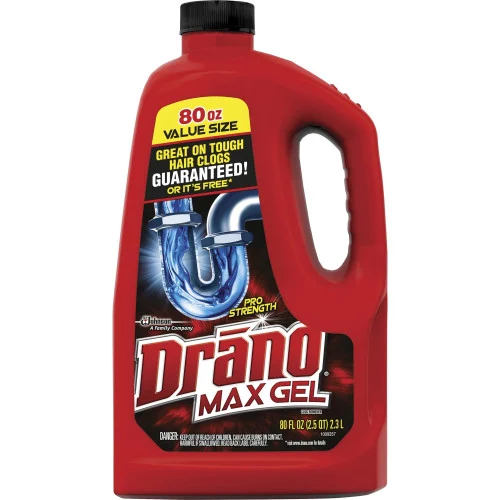
Chemical drain cleaners, typically in a liquid form, are powerful solutions that utilize strong chemicals to break down clogs. Products like Drano Max Gel® and Liquid-Plumr® are well-known for their effectiveness at dissolving hair, soap scum, and other organic matter. These products use a combination of sodium hypochlorite and sodium hydroxide to clear blockages.
Zep®offers a variety of drain cleaning products, including a sulfuric acid-based cleaner designed for severe clogs, although it requires extreme caution during use.
Enzyme and Bacterial Cleaners
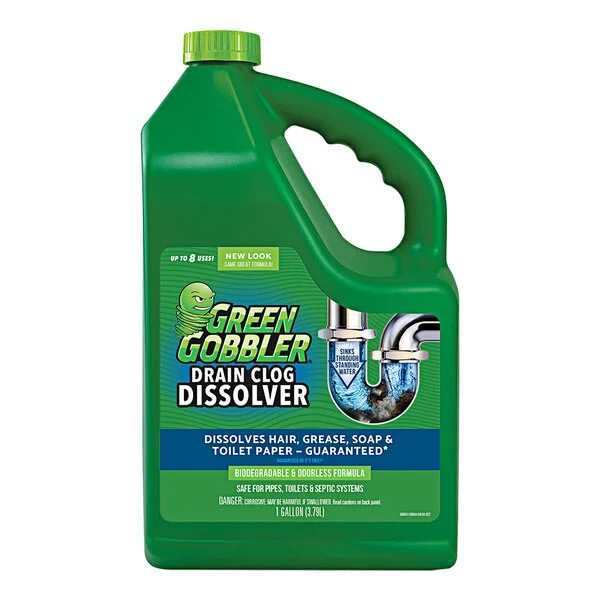
Enzymatic and bacterial drain cleaners, such as Green Gobbler® and Bio-Clean®, use natural enzymes or bacteria to break down organic matter. These products are safer for pipes and offer an environmentally friendly drain cleaning solution, making them a great choice for regular maintenance.
Green Gobbler employs a blend of natural enzymes to digest organic matter, grease, and soap scum, while Bio-Clean combines natural bacteria and enzymes for effective cleaning and maintenance.
Mechanical drain cleaners involve physically removing clogs using tools like plungers, drain snakes, and hydro-jetting. Plungers are effective for minor clogs in sinks and toilets, while drain snakes can reach deep into pipes to remove or break up blockages. Hydro-jetting is a professional-grade method that uses high-pressure water to clear severe clogs and even descale the buildup in drainpipes.
How Effective Are Different Liquid Drain Cleaners?
The effectiveness of liquid drain cleaners largely depends on the type of clog and the product you choose. Here's a comparison table to guide you:
| Type of Cleaner | Best Suited For | Time to Work | Risks | Cost |
| Caustic Cleaners | Hair, grease clogs | Fast (10-30 mins) | Corrosive to metal pipes with frequent use | $10-15 |
| Oxidizing Cleaners | Organic material | Moderate (30-60 mins) | Harmful fumes if mixed improperly | $12-18 |
| Acid Cleaners | Severe blockages | Very fast (5-15 mins) | High corrosion risk, dangerous to use | $15-20 |
| Enzymatic Cleaners | Regular maintenance | Slow (hours-days) | None, safe for pipes and septic systems | $10-20 |
| Mechanical Tools | Any blockage | Immediate | Requires manual effort, no chemicals | $5-40 |
Choosing the Right Drain Cleaner
Selecting the best drain cleaner depends on several factors.
- Consider the type of clog you are dealing with. For hair and soap scum, Liquid-Plumr® or enzymatic cleaners may be your best bet. If grease is the culprit, Drano Max Gel® or Green Gobbler® would be effective choices. For severe blockages, Zep or a professional drain cleaning plumbing service may be necessary.
- Think about your pipe material. PVC pipes may not handle harsh chemicals well, so enzymatic cleaners or mechanical methods are preferable. Most cleaners are safe for metal pipes, but frequent use of chemical cleaners can cause corrosion.
- Environmental impact is another important consideration. If eco-friendliness is a priority, Green Gobbler® and Bio-Clean® are excellent options.
- Safety concerns should guide your choice. If you have children or pets, safer options like enzymatic cleaners or mechanical methods are recommended.
Despite their strengths, chemical cleaners can struggle with large, solid clogs like food particles or objects stuck deep within the main drainpipes. Enzymatic cleaners are not a quick fix for tough clogs and may take several treatments to see results. Mechanical tools like augers or plungers can be more effective in these cases, but even they may not work on extreme blockages requiring stronger methods.
Safety Concerns and Health Risks
When using liquid drain cleaners, safety is paramount for homeowners and plumbers alike. Read and follow the instructions on the product label, and never mix different drain cleaners, as this can lead to dangerous chemical reactions. Plumber Magazine warns about the hazards of drain cleaning noting the danger of drain cleaning chemicals.
One of the biggest concerns with liquid drain cleaners is the release of toxic fumes. Caustic and acid-based cleaners can produce harmful gases, especially when mixed with other chemicals like bleach or ammonia. These fumes can irritate the respiratory system, causing coughing, throat irritation, or even shortness of breath, particularly in poorly ventilated areas.
Burns on Skin and Eye Contact
Direct contact with liquid drain cleaners poses significant risks. The harsh nature of these products can cause severe skin burns, irritation, or even permanent damage to the eyes if splashed. Acid-based cleaners are especially hazardous and can cause instant burns upon contact.
If any product gets splashed in your eyes or on your skin, flush the area with water immediately and seek medical attention.
Protective Equipment Recommendations
To minimize these risks, always handle liquid drain cleaners with care. Wear protective gear, such as rubber gloves and safety goggles to avoid direct contact with the skin or eyes. When using these products, ensure the area is well-ventilated by opening windows or turning on exhaust fans.
Environmental Impact
Liquid drain cleaners also pose a threat to the environment. The toxic substances they contain can end up in local water systems, harming aquatic life and disrupting ecosystems. Even wastewater treatment plants struggle to fully neutralize these chemicals, allowing traces to remain in the environment.
For disposal, always follow local hazardous waste regulations. Never pour unused cleaners down the drain or dispose of them in regular trash to prevent environmental contamination.
Proper Disposal
After you are through, what do you do with the empty bottle? Can you just toss it in the trash can? Chemicals used in liquid drain cleaners are considered household hazardous waste (HHW) and should not be disposed of in regular garbage.
Drop-off Locations in Orlando, FL:
- Orange County Landfill: 5901 Young Pine Road, Orlando, FL 32829
- Porter Transfer Station: 1326 Good Homes Road, Orlando, FL 32818
Both locations are open Monday through Saturday, 8 a.m. to 5 p.m.
Cost Considerations
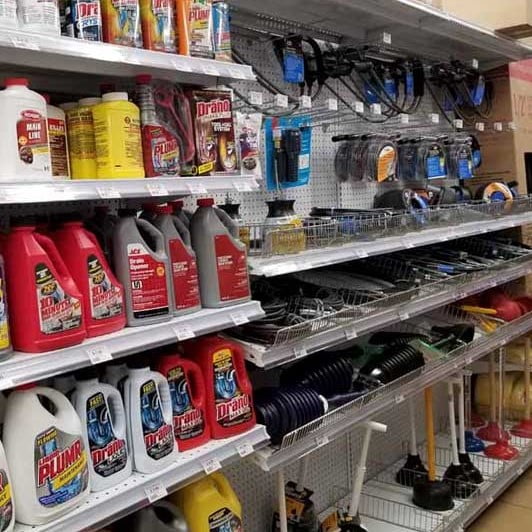
The cost of cleaning a clogged drain can vary depending on your chosen method. Liquid drain cleaners range from $10 to $20, where at Target the Drano Max Gel cost $17.89 while eco-friendly options like Green Gobbler® cost about $11.84 at WalMart. Mechanical tools, such as plungers and augers, can range from $5 to $40. Professional drain cleaning services can cost between $300 and $500, and hydro-jetting with camera inspection can cost between $900 and $1500. These methods are a bit more costly, but they offer a thorough, complete cleaning of the drain line and in-pipe inspection as well as a long-lasting solution for clogs.
Best Practices for Drain Maintenance
Regularly flushing drains with hot water, using a mesh strainer, and avoiding grease can prevent blockages. Household solutions, such as baking soda and vinegar, offer safe alternatives for clearing soft clogs.
Natural Drain Cleaning Solutions
Besides expensive store-bought liquid drain cleaners, many household items can be used to clear soft clogs without making a trip to the store. These DIY solutions are a safe alternative to chemical cleaners and may work quicker than enzymatic cleaners.
Here are a few ways to use these household items:
- Baking Soda and Vinegar: A classic combination for breaking down minor clogs and clearing odors. Use ½ cup of baking soda followed by ½ cup of vinegar, let it sit for 15-30 minutes, and flush with hot water.
- Boiling Water: Flush your drains with boiling water once a week to clear grease and soap scum before they build up.
- Salt and Baking Soda: Mix equal parts salt and baking soda, pour it into the drain, and follow with boiling water. Let it sit overnight for the best results.
These natural solutions work best on grease and soap scum but may not work on hair clogs. For best results, use once a month for regular maintenance. If clogs persist after trying DIY or chemical solutions, it’s best to call a professional.
Frequently Asked Questions
Q: Can I clean a clogged drain myself?
A: While DIY methods can be effective for minor clogs, many blockages may require professional assistance. Use chemical cleaners sparingly, and always follow directions.
Q: Are chemical drain cleaners safe for all pipes?
A: Drano Max® and Liquid-Plumr® both claim to be safe for all pipes. Both products have been used in homes since 1969, and many homeowners consider them safe and effective. However, with other products, there's no way to tell how prolonged use would affect pipes in the long term.
Q: What are the benefits of professional drain cleaning services?
A: Professional drain cleaning service can thoroughly remove accumulated debris, improve drain flow, prevent future clogs, and extend the lifespan of your plumbing system. It also reduces the risk of unpleasant odors and water damage.
Q: What are the best liquid drain cleaners for clogged sinks?
A: The right choice will depend on the cause of the clog. Drano®, Green Gobbler®, and Liquid-Plumr® are all good choices. The best option is the one that fits the clog’s nature, your preferences, and budget.
Professional Drain Cleaning Services
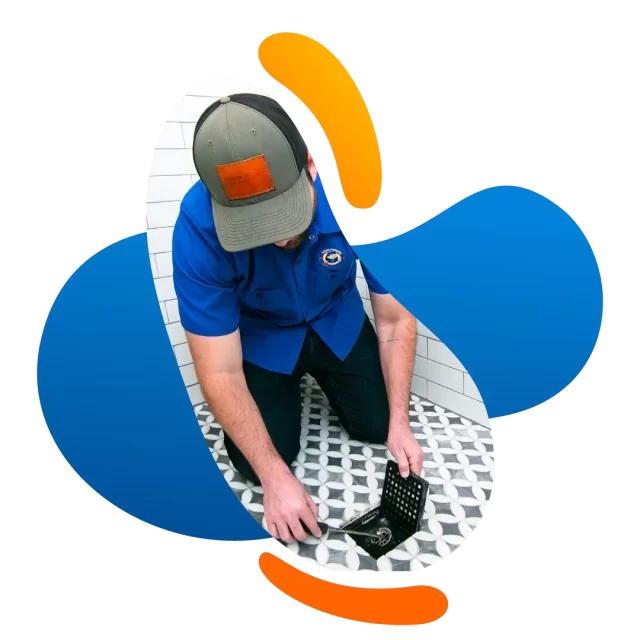
Clogged drains are a common household issue, but they can be easily managed with the right approach. While chemical, enzymatic, and DIY solutions are effective for minor clogs, tougher blockages or frequent drain clogs, may require professional help. For long-term solutions and peace of mind, trust the experts at Choice Plumbing Orlando.
Don’t let a small clog become a bigger problem—reach out to us today for expert drain cleaning service in the Orlando area. We’re here to keep your plumbing running smoothly and your home protected from costly repairs. Contact Choice Plumbing Orlando for a free drain cleaning estimate!

